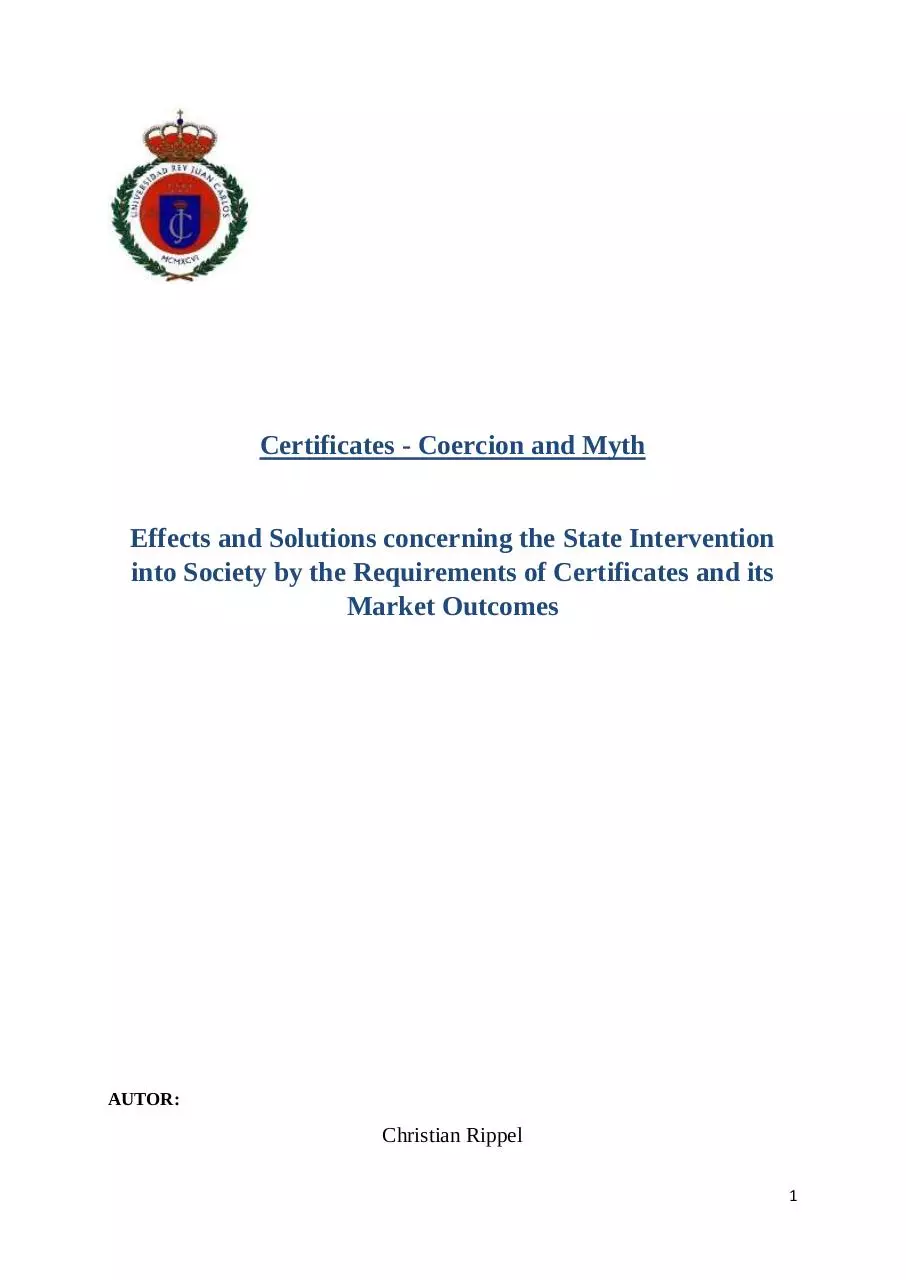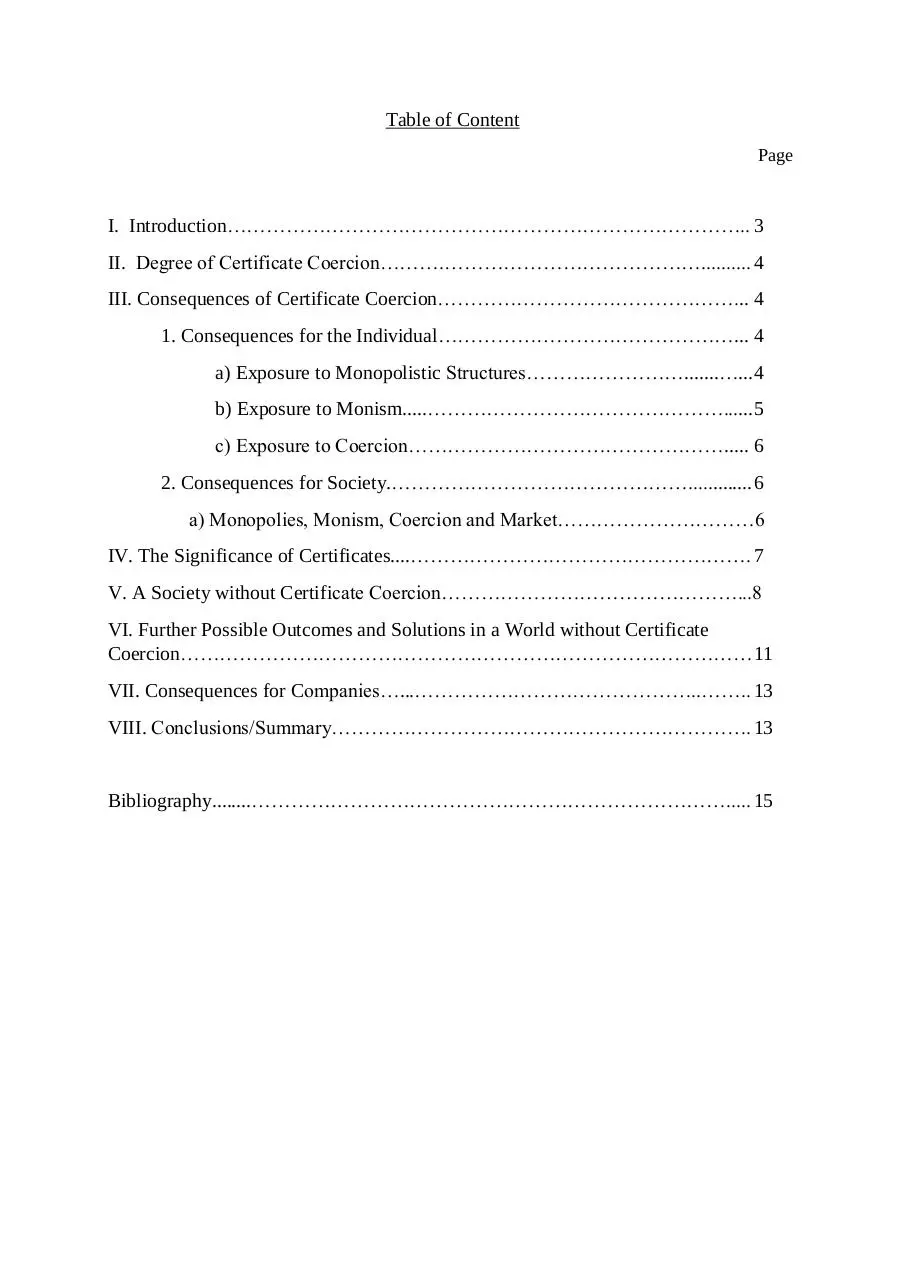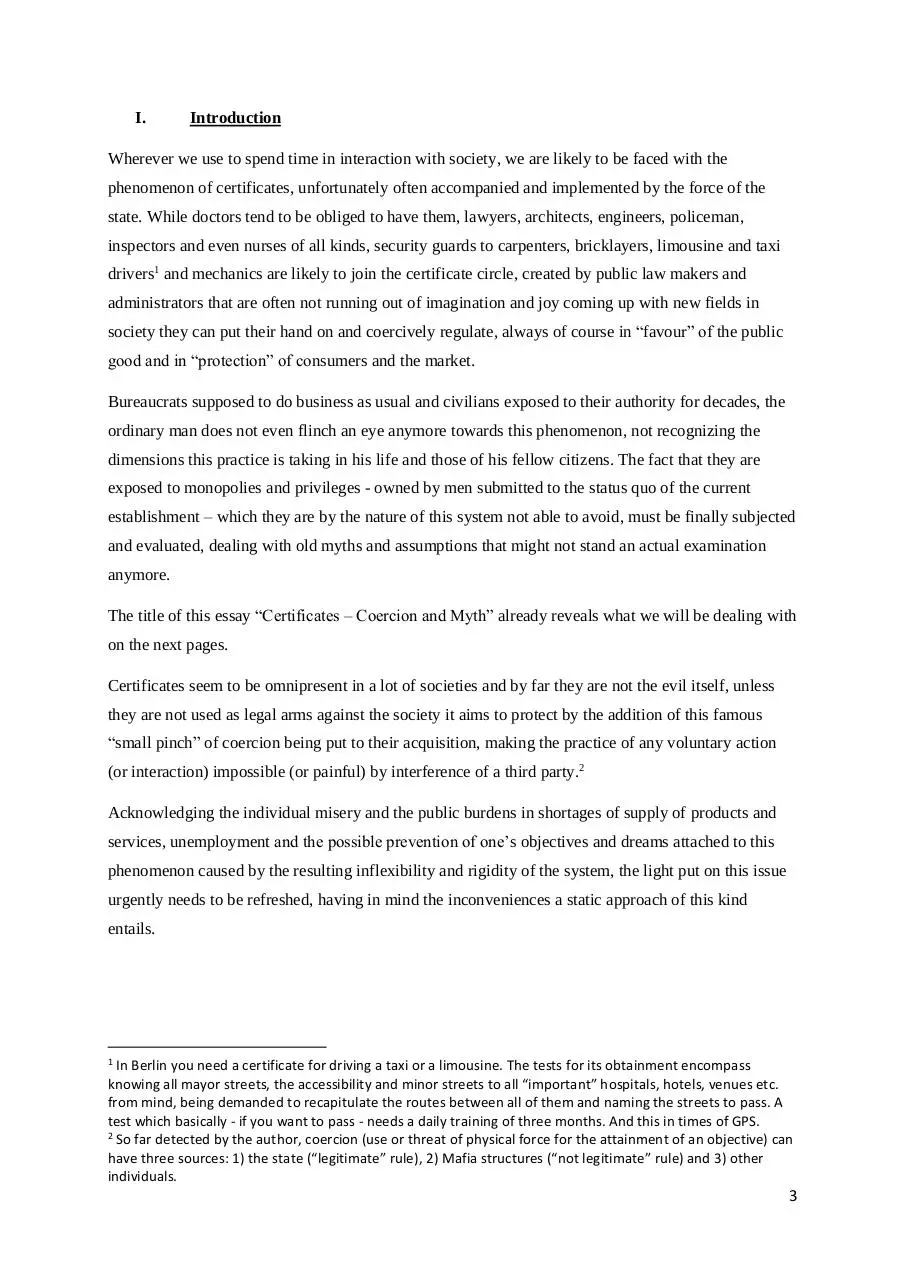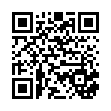Certificate Coercion and Myth (Christian Rippel) (PDF)
File information
Author: Melocoton
This PDF 1.5 document has been generated by Microsoft® Word 2016, and has been sent on pdf-archive.com on 17/01/2017 at 01:14, from IP address 80.29.x.x.
The current document download page has been viewed 953 times.
File size: 1.03 MB (15 pages).
Privacy: public file





File preview
Certificates - Coercion and Myth
Effects and Solutions concerning the State Intervention
into Society by the Requirements of Certificates and its
Market Outcomes
AUTOR:
Christian Rippel
1
Table of Content
Page
I. Introduction…………………………………………………………………….. 3
II. Degree of Certificate Coercion……….………………………………….......... 4
III. Consequences of Certificate Coercion………………………………………... 4
1. Consequences for the Individual………………………………………... 4
a) Exposure to Monopolistic Structures…………………….......…...4
b) Exposure to Monism.....………………………………………......5
c) Exposure to Coercion…………………………………………..... 6
2. Consequences for Society.………………………………………............. 6
a) Monopolies, Monism, Coercion and Market…………………………6
IV. The Significance of Certificates....……………………………………………. 7
V. A Society without Certificate Coercion………………………………………...8
VI. Further Possible Outcomes and Solutions in a World without Certificate
Coercion…………………………………………………………………………… 11
VII. Consequences for Companies…...……………………………………..…….. 13
VIII. Conclusions/Summary………………………………………………………. 13
Bibliography........………………………………………………………………..... 15
2
I.
Introduction
Wherever we use to spend time in interaction with society, we are likely to be faced with the
phenomenon of certificates, unfortunately often accompanied and implemented by the force of the
state. While doctors tend to be obliged to have them, lawyers, architects, engineers, policeman,
inspectors and even nurses of all kinds, security guards to carpenters, bricklayers, limousine and taxi
drivers1 and mechanics are likely to join the certificate circle, created by public law makers and
administrators that are often not running out of imagination and joy coming up with new fields in
society they can put their hand on and coercively regulate, always of course in “favour” of the public
good and in “protection” of consumers and the market.
Bureaucrats supposed to do business as usual and civilians exposed to their authority for decades, the
ordinary man does not even flinch an eye anymore towards this phenomenon, not recognizing the
dimensions this practice is taking in his life and those of his fellow citizens. The fact that they are
exposed to monopolies and privileges - owned by men submitted to the status quo of the current
establishment – which they are by the nature of this system not able to avoid, must be finally subjected
and evaluated, dealing with old myths and assumptions that might not stand an actual examination
anymore.
The title of this essay “Certificates – Coercion and Myth” already reveals what we will be dealing with
on the next pages.
Certificates seem to be omnipresent in a lot of societies and by far they are not the evil itself, unless
they are not used as legal arms against the society it aims to protect by the addition of this famous
“small pinch” of coercion being put to their acquisition, making the practice of any voluntary action
(or interaction) impossible (or painful) by interference of a third party.2
Acknowledging the individual misery and the public burdens in shortages of supply of products and
services, unemployment and the possible prevention of one’s objectives and dreams attached to this
phenomenon caused by the resulting inflexibility and rigidity of the system, the light put on this issue
urgently needs to be refreshed, having in mind the inconveniences a static approach of this kind
entails.
1
In Berlin you need a certificate for driving a taxi or a limousine. The tests for its obtainment encompass
knowing all mayor streets, the accessibility and minor streets to all “important” hospitals, hotels, venues etc.
from mind, being demanded to recapitulate the routes between all of them and naming the streets to pass. A
test which basically - if you want to pass - needs a daily training of three months. And this in times of GPS.
2
So far detected by the author, coercion (use or threat of physical force for the attainment of an objective) can
have three sources: 1) the state (“legitimate” rule), 2) Mafia structures (“not legitimate” rule) and 3) other
individuals.
3
II.
Degree of Certificate Coercion
The intensity of this phenomenon differs from each national, federal or regional administrative
apparatus in the world to another. Often better, sometimes less known by the actors of society its
influence is extending over brighter and smaller fields to any possible kind of occupations often
scratching the typical fields of “exigent occupations” extending even to the most banal professions
already mentioned in the introduction.
III.
Consequences of Certificate Coercion
We can divide up the range of effects to the most basic fields in individual and societal consequences.
1. Consequences for the Individual
a) Exposure to Monopolistic Structures
The exposure to monopolies is hampering the individual human being in his free decision for an
education that fits his needs. Monopolistisc structures are therefore caused by the state monopoly of
certificates from at least four sides.
On one side, institutions must gain the exclusive right to issue the intended certificates. This usually
entails a multitude of administrative requirements that tend to be arduous to fulfil and in the end,
restrict the number of institutions being able to sustain and therefore offer their services to the
individual willing to learn.
On the other side, the state thereby often tends to simultaneously distort the natural and free learning
structure by subsidizing some (often state-near) institutions, creating high obstacles for institutions
that are not equipped with these privileges to compete for students and so as well subsidizes the
disappearance of the latter. Often the state-privileged institutions are disproportionately well equipped
and are held artificially cheap letting other institutions no chance on fair grounds to compete with
them in order to develop proper structures that could be equally affordable, but au contraire to the
former would evolve naturally and also sustainable out of the free demand of society.
As a third effect of this, there are exploding costs for education relatively (since competition for
students would be in charge) to bearable tuition fees, when unnecessary expenses would be reduced to
4
a minimum.3 Since economic reality does not even spare governments,4 students and above all parents
should be more sceptic about the status quo of the current public educational system. Because even if
the impression is being preserved strongly that the educational systems in some countries are supposed
to be free, the reality says they are not and the public budget plan tells us, that the ordinary tax payer is
actually paying the bill, so the bricklayer is paying for the university of the doctor’s son.
So, if free education is really wanted and not just an illusion of it, we must let the free society with its
thousands of creative entrepreneurs work out solutions for this demand and not inefficient bureaucrats
who are generously filling the pockets of often lousy, dusty and incompetent professors and the rat
tails of administrative staffs looking forward to anything else but serving the student needs.
Fourth, the offer is drastically shrunk by the tendencies of the educational monism we shall turn to in
point b).
Therefore, the individual finds itself therefore exposed to a very much shrunk, reduced and crippled
offer of education and almost in full control by these few institutions that manage to survive in this
coercive system,5 often being obliged to fulfil static demands that won’t be free of arbitrariness, since
the mechanism of free offer and choice and therefore the achievement of the best working
circumstances of a learning environment is given no air to breath.
b) Exposure to Monism
Unfortunately, is does not stop here and we just entered the beginning of a whole string of
consequences. Not just that students and their parents will suffer the already mentioned downsides,
since the framework and even the syllabuses are stipulated to a large extent by bureaucrats, little space
will be left - relatively to the wide range of science and the complexity of our world - to follow, to
teach and also to abandon alternative and mainstream approaches, whose process could be considered
as the core of any scientific environment and progress.
Stealing these opportunities of scientific polemics, controversies and plurality, different schools of
thought and the diverse approaches to education itself from society - which in a free society would all
3
The unimaginable creative, innovative and most of all student-friendly forces of such a system are
unforeseeable and up to the needs of the students themselves, of which tuition-reduction should probably be
one of the most important (Who in the world would like to leave school or university with a lot of debt?). We
can therefore only refer to the logical process of demander(student)- friendly policies by educational
institutions which would be evoked by the free competition for students and therefore the must to appeal to
their needs and demands. As some easy examples, there could be repeatable online courses, studentorganized courses, massive expense-reduction through less administrative obligations by the state, faculty-,
building- and professor-sharing by different institutions, third-party financing, incentives for experts to give
courses for free, working offers for students, self-financing structures through cooperation with outside and
partner institutions etc. etc.
4
Very illustrative herefore for example: Eugen Böhm-Bawerk (1914),”Macht oder Ökonomisches Gesetz”,
Zeitschrift für Volkswirtschaft, Sozialpolitik und Verwaltung, Bd. XXIII, S.205–271.
5
Relatively to the multitude of possibilities to learn and later on to practice their job in a free non-coercive
system.
5
free to be chosen from, as long as they are gaining enough acceptance to sustain - will not just make
the individual a lot poorer, but lead society into a slow but certain status of spiritual decadence, not
being able to adequately approach and address the multitude of phenomena in our highly complex
world.
A free educational system by far wouldn’t lead to an educational mayhem as often falsely supposed, as
the different approaches are still in competition with each other and the most suitable ones meeting the
human demands will gain acceptance and quickly be challenged again in a continuous process of
widening human knowledge. The significance of absurd and useless concepts would be diminished
and abandoned soon as not being appreciated enough by the needs of society’s participants.
c) Exposure to Coercion
Last of all, bureaucrats once again permitting themselves the violent interference6 into free human
cooperation which does not just do no harm to anybody, but au contraire could even lead to the
blossom of the educational landscape.
This freedom of choice is taken from the individual, forcing him into a bureaucratic, static,
monopolistic and monistic frame that he wouldn’t have followed in this way, if he had been free to
choose otherwise in a society that would allow him to choose freely.7
2. Consequences for Society
a) Monopolies, Monism, Coercion and market
As effecting the individual, the already mentioned consequences therefore also effect society as being
considered as the individuals living and in the pursuit of the melioration of their lives cooperating with
each other. The number of people – the problem being considered in the macro-sphere – now has just
increased suffering and being deprived of the mentioned benefits of setting the human ingenuity,
diversity and willingness to cooperate finally free and letting the forces of human creativity and
inventiveness breath air, as well as the complexity of the process of affection is increasing
enormously. Not to mention that the costs of this static educational system and the costs of crippled
human creativity, which could have been brought forward by new educational approaches, are being
paid by all into the pockets of a few. To the distorting market consequences we shall turn to later.
6
As the violence may not be seen directly due to pre-obedience by individuals, one should through simulation
of cases of non-obedience to these rules, see what would be the final consequences of not being obedient,
namely the loss of one’s property or jail.
7
The probability tends to be zero concerning a system under free (and for that unimaginable and
unforeseeable different) circumstances that an individual would choose exactly the same educational path,
within the same institution in the same forms as they are existing today.
6
IV.
The Significance of Certificates
As a crucial point in grasping the absurdity of the status quo we need to consider the question what the
holding of a certificate in the end really guarantees to an outside observer,who has no information
about the certified person confronted with. The only thing we really can determine a priori in this
question is, that the holding of a certificate does in the end not really have to mean more than having
fulfilled the necessary criteria for its acquisition being determined by the issuing institution and the
state. With no intention to say, that the demanded standards by the issuing institution are necessarily
lacking a good and exigent quality, relying on a certificate as a piece of paper with an important
looking symbol and stamp, firmed by a person with an important sounding name as the only source of
verification for the qualities and skills of a person, could lead into a dangerous intellectual trap.
How many persons do we know that are holding a certificate in anything and do not even have a clue
anymore about the things that it is certifying? How many students in the world start learning for exams
just a week before the exam is taking place or even in the last hour before, still passing and are later on
being attested the skills of the asked matter („Cramming “or „Bulimic Learning“). Which quality can
generalized exams and tests at all assure to have obtained skills after having them passed? What
guarantees that the memorized and not seldom occurring then pasted knowledge really sustains after
the exam? Does an exam or internship guarantee that a person really grasped the demanded matter?
How often has it occurred already that a person is leaving an education institution entering the
working sector and finding himself having no clue about the things he is confronted with there (mostly
in educations with no references to the real practical world). Does not holding a certificate prevent any
person of developing skills and qualities in a certain field? Isn’t the main drive of obtaining knowledge
and skills not more than the interest and curiosity in a certain field rather than it is depending on
having passed a certain test? And are humans immune to unlearn skills they once attained and were
issued in their lives? And if the answer to this question is no, what makes us attributing them those
qualities in an almost life-guaranteed way? How do we deal with the phenomena of cheating, rightguessing and ghost-writing?
But it even can get worse, looking at the phenomenon of reliance and self- deception, a certificate is
almost becoming a sort of surrogate-religion that makes people believe to really have achieved
something with the consequence of not exerting oneself more as to the demanded tasks by an
institution. Not exerting oneself to become a Master in his field when the general education is actually
just supposed to be the preparation for later on achievements that can just derive from acting within
the demand of society. In this case, which might not occur to seldom, certificates can even have a
reverse effect of having years not invested into real education, but stolen by a static, administrative
apparatus which deceives its students and their dreams in their lives, subliminally attesting them that
their certificate is the only thing they need in order to become a skilled person and to be appreciated by
society later on.
7
Therefore, the strive for a diploma as a proof of social superiority and as a need of social recognition,
has launched to bigger and greater dimensions and their alleged importance even having become a
self-fulfilling prophecy lowering the quality of certain professions and deceiving the expectations of
individuals being blinded by their shine.
V.
A Society without Certificate Coercion
How do we choose a doctor, a lawyer, a carpenter, a baker or a plumber? Do we ever have a look at
their certificates before engaging with them? And even if we would, would the certificate tell us
anything about the quality of the other part as a supplier? And let’s even go so far that the other part is
holding a diploma of a world renown elite-university in which we have a lot of trust, would that
automatically mean that he will offer us an invariable good service in every thinkable case and is
immune to give a service that could vary depending on sympathies towards clients, his personal mood
and motivation, implying that even skills themselves are a just necessary but never a sufficient part of
a good performance?8
So what would society do if the government wouldn’t oblige its citizens just being able to cooperate
with each other in certain fields, as long as one of the parties is fulfilling some imposed criteria from
above holding a certificate? Would the world perish and turn into a menace society of traitors and
charlatans?
First of all, the disappearance of a coercive rule does not necessarily correlate with the disappearance
of the institute that it aimed to protect before. To the contrary, if the institute was actually doing a
good thing for society, what could prevent anybody of maintaining it, just when its coercive
imposition – just as one alternative for its protection - is gone? Of course, the answer is: nothing.
Before I visit a doctor or turn to a lawyer I better make sure that the person I am turning to is skilled in
his profession and knows what he is doing. Does this person necessarily need a diploma or an official
approval from a public institution? Of course not. Concerning the core of skills, whose qualities are
determined by Theoretical-Knowledge, Practical-Experience (just a theoretical knowledge would be
useless for its application) and a certain Temporality (without a certain degree of recurring practice the
skills decrease) an issued piece of paper doesn’t make the difference.9 So, both, the diploma and the
8
You could be the best in your profession in the world but refuse to provide a good service to people you don’t
like, be basically unmotivated or because of permanent fatigue unable to practice your profession or just don’t
see a need in it.
9
Besides that, entrepreneurial (human) knowledge is also always subjective and practical, private and
dispersed and tacit and not possible to articulate (Huerta de Soto (2005), Pp. 52-60; Meseguer (2015), P. 202).
8
official approval do not necessarily say anything about the skills of a person, not at all about those of
an institution.10
Even if we would presume, that a renewal of the license is demanded by the state every two years or
so, by which standards does a public institution want to determine and thereby assure that the tests
they’re demanding will in the end culminate into skills that are demanded by society? Wouldn’t it
make a lot more sense to quit this intermediate stage (with all the miseries that it is carrying along) and
let society - for which this intermediate stage was supposed to be originally designed for - determine
directly who they are acknowledging is capable of fulfilling their needs and who is not? Now we have
finally come to the crucial point, the demand and offer of and by society, or better expressed in one
word, the market, the institution to assure that we get the best possible offers for the resources we are
ready to dedicate for the fulfilment of our needs.
If a person without any experience, knowledge and skills decides from one day to another to fulfil his
childhood dream and become a doctor, he is very free to do so, but it is very unlikely, that he will get
any patients to trust him. People will get informed (as they already do, even within a state control of
certificates) via friends, colleagues, family, their social network in real life or online platforms to make
sure they obtain the best service they can possibly get, relatively to the importance they attribute to
their certain need. The more important the matter (from an always subjective perspective), the more a
person will get informed. The vast emergence of new online rating platforms, where you can evaluate
basically everything from doctors, lawyers to pizza deliveries and barbers actually indicates that the
people themselves already have recognized the problem, that just a piece of paper is nothing one
should rely on.
Let’s assume a second case. A person with experience, knowledge and skills but without a university
diploma (exam nerves, free spirit, poor family, aversions towards the education system, etc. etc.) but
an excellent scholar in his medical field, equipped with innovative, well-functioning methods (because
he didn’t join the conventual education, rather did internships in hospitals and gained a lot of
experience by treating people for free11) decides to fulfil his childhood dream and become a doctor. A
lot of people are queuing up the first day of the opening of his new praxis to get treated by him, having
heard and being told by different mediums they trust, that he is a very good medic and besides that
10
The human tends to explain certain phenomena by looking for synonyms for it, rather than trying to explain
the phenomena themselves. As it is being referred to thieves by certain groups from foreign areas, dumb as to
any other opinion but its own and a good vine is being judged by the country of its origin none of these
comparisons will be never fully equivalent and neither will it make the phenomena in the end intelligible. So
rather as looking for synonyms, humans should aim to explain the phenomenon itself and shouldn’t turn to
mystic methods that are lacking any scientific standards.
11
Very illustrative for this example, the figure of Philo Farnsworth, whose work according to Rothbards
research benefited a lot from his lacking contact to the conventional scientific world. Also, Einstein should have
suggested (Quote of Rothbard) “that refugee scientists take jobs as lighthouse-keepers, so that they could
enjoy needed isolation”. see: Rothbard (2004), “Science, Technology, and Government”, P. 14 f.
9
Download Certificate - Coercion and Myth (Christian Rippel)
Certificate - Coercion and Myth (Christian Rippel).pdf (PDF, 1.03 MB)
Download PDF
Share this file on social networks
Link to this page
Permanent link
Use the permanent link to the download page to share your document on Facebook, Twitter, LinkedIn, or directly with a contact by e-Mail, Messenger, Whatsapp, Line..
Short link
Use the short link to share your document on Twitter or by text message (SMS)
HTML Code
Copy the following HTML code to share your document on a Website or Blog
QR Code to this page

This file has been shared publicly by a user of PDF Archive.
Document ID: 0000537624.